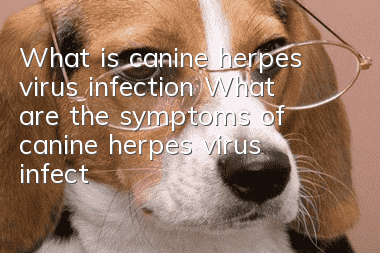What is canine herpes virus infection? What are the symptoms of canine herpes virus infection?

Canine herpes virus infection is an acute, afebrile, and fatal disease in newborn puppies. Dogs older than 21 days mainly show symptoms of upper respiratory tract infection. Adult dogs can cause infertility, miscarriage and stillbirth in female dogs, and symptoms of penitis, posthitis and spermatic cord in male dogs.
【Symptoms】
The incubation period of canine herpes virus infection is 4-6 days, and puppies under 21 days old can cause fatal infection. In the early stages, sick dogs suffer from dementia, are depressed, do not eat milk, have weak body, difficulty breathing, sensitive and painful abdomen during pressure test, and loose and yellow feces. The body temperature is not high, and the dog keeps howling, restless, and trembling. Some dogs show symptoms of rhinitis, including serous rhinorrhea, extensive spotty bleeding on the surface of the nasal mucosa, and the skin on the inner thigh can turn into red papules. In the later stages, sick dogs develop opisthotonus, epilepsy, and loss of consciousness. Most dogs die 24-48 hours after symptoms appear. Recovering dogs can cause permanent neurological symptoms, movement disorders, blindness, etc.
Dogs older than 21-30 days mainly show symptoms of upper respiratory tract infection, such as coughing and sneezing. Symptoms of pneumonia can occur when secondary mixed infections occur. Adult female dogs mainly suffer from reproductive tract infection and diffuse vesicular lesions in the vaginal mucosa, which can cause miscarriage, stillbirth and infertility in pregnant female dogs. Chronic inflammation of the penis and foreskin can be seen in male dogs, and there may be a large amount of purulent secretions in the foreskin.
【Preventive Treatment】
There has been little progress in vaccine development for this disease, and no vaccine is currently available.
Self-made serum from recovered bitches or puppies can be used for injection to prevent the death of infected puppies. Sick dogs should be kept warm (around 37°C), and dogs with upper respiratory tract symptoms should be given broad-spectrum antibiotic therapy and rehydration therapy.
- What to do if your dog has a miscarriage
- How to train a mini poodle? Poodle training tips!
- How often should dogs be dewormed? A must-read for novice shit shovelers
- Precautions for raising Chow Chow in summer
- Causes and treatments for sneezing in dogs
- How to train cotton veil dogs to be obedient
- How many months does it take for a puppy to have toilet training?
- Is it because the dog’s eyes are sticky and sticky?
- How often should a puppy be vaccinated?
- How to raise red swordfish? red swordfish illustration



